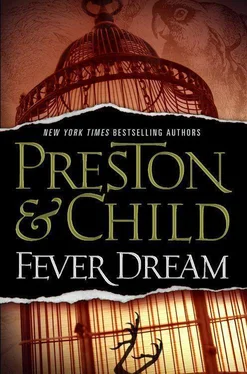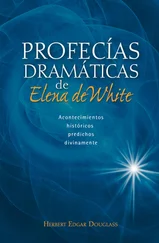Douglas Child - Fever Dream
Здесь есть возможность читать онлайн «Douglas Child - Fever Dream» весь текст электронной книги совершенно бесплатно (целиком полную версию без сокращений). В некоторых случаях можно слушать аудио, скачать через торрент в формате fb2 и присутствует краткое содержание. Жанр: Триллер, на английском языке. Описание произведения, (предисловие) а так же отзывы посетителей доступны на портале библиотеки ЛибКат.
- Название:Fever Dream
- Автор:
- Жанр:
- Год:неизвестен
- ISBN:нет данных
- Рейтинг книги:3 / 5. Голосов: 1
-
Избранное:Добавить в избранное
- Отзывы:
-
Ваша оценка:
- 60
- 1
- 2
- 3
- 4
- 5
Fever Dream: краткое содержание, описание и аннотация
Предлагаем к чтению аннотацию, описание, краткое содержание или предисловие (зависит от того, что написал сам автор книги «Fever Dream»). Если вы не нашли необходимую информацию о книге — напишите в комментариях, мы постараемся отыскать её.
Fever Dream — читать онлайн бесплатно полную книгу (весь текст) целиком
Ниже представлен текст книги, разбитый по страницам. Система сохранения места последней прочитанной страницы, позволяет с удобством читать онлайн бесплатно книгу «Fever Dream», без необходимости каждый раз заново искать на чём Вы остановились. Поставьте закладку, и сможете в любой момент перейти на страницу, на которой закончили чтение.
Интервал:
Закладка:
The Doane house was located about two miles past town, up an unpaved drive that had once been well tended but was now little more than a rutted track. He drove cautiously, careful not to bottom out the Spyder in the hard-packed dirt. Dense stands of trees crowded in on both sides of the road, their skeletal branches lacing the night sky above their heads. D'Agosta, flung around in his seat until his teeth rattled, decided that even the Zambian Land Rover would have been preferable in these conditions.
Pendergast rounded a final bend and the house itself came into view in the headlights, the sky roiling with clouds above. D'Agosta stared at it in surprise. He had expected a large, elegant structure, as ornate as the rest of the town was plain. What he saw was large, all right, but it was hardly elegant. In fact, it looked more like a fort left over from the days of the Louisiana Purchase. Built out of huge, rough-edged beams, it sported tall towers at either end and a long, squat central facade with innumerable small windows. Atop this facade was the bizarre anachronism of a widow's walk, surrounded by spiked iron railings. It stood alone on a small rise of land. Beyond to the east lay forest, dense and dark, leading to the vast Black Brake swamp. As D'Agosta stared at the structure, a tongue of lightning struck the woods behind, briefly silhouetting it in spectral yellow light.
"Looks like somebody tried to cross a castle with a log cabin," he said.
"The original owner was a timber baron, after all." Pendergast nodded at the widow's walk. "No doubt he used that to survey his domain. I read that he personally owned sixty thousand acres of land--including much of the cypress forests in the Black Brake--before the government acquired it for the national forest and a wilderness area."
He pulled up to the house and stopped. The agent glanced briefly in the rearview mirror before maneuvering the car around to the back and killing the engine.
"Expecting company?" D'Agosta asked.
"No point in attracting attention."
Now the rain started: fat drops that drummed against the windshield and the fabric top. Pendergast got out, and D'Agosta quickly followed suit. They trotted over to the shelter of a rear porch. D'Agosta glanced up a little uneasily at the rambling structure. It was exactly the kind of eccentric residence that might attract a novelist. Every tiny window was carefully shuttered, and the door itself was secured with a padlock and chain. A riot of vegetation had grown up around the house, softening the rough lines of its foundation, while moss and lichens draped some of the beams.
Pendergast took a final look around, then turned his attention to the padlock. He held it by the hasp, turning it this way and that, and then passed his other hand, holding a small tool, over the cylinder housing. A quick fiddle and it snapped open with a loud creak. Pendergast removed the chain and let it drop to the ground. The door itself was also locked; Pendergast bent over it and swiftly defeated the mechanism with the same tool. Then he rose again and turned the knob, pushing the door open with a squeal of protesting hinges. Pulling a flashlight from his jacket, he stepped inside. D'Agosta had long ago learned, when working with Pendergast, to never get caught without two things: a gun and a flashlight. Now he pulled out his own light and followed Pendergast into the house.
They found themselves in a large, old-fashioned kitchen. In the center stood a wooden breakfast table, and an oven, refrigerator, and washing machine were arranged in a porcelain row along the far wall. Beyond that, any resemblance to a normal family kitchen ended. The cabinets were thrown open, and crockery and glassware, almost all of it broken, streamed out from the shelves and onto the countertops and floor. Remains of foodstuffs--grains, rice, beans--lay scattered here and there, desiccated, scattered by rats, and fringed with ancient mold. The chairs were overturned and splintered, and the walls were punctuated with holes made by a sledgehammer or--perhaps--a fist. Plaster had fallen from the ceiling in chunks, making miniature explosions of white powder here and there on the floor, in which vermin tracks and droppings could be clearly seen. D'Agosta played his beam around the room, taking in the whirlwind of destruction. His light stopped in one corner, where a large, long-dried accumulation of what seemed to be blood lay on the floor; on the wall above, at chest height, were several ragged holes made by blasts from a heavy-gauge shotgun with similar sprays of dried blood and offal.
"I'd guess this is where our Mr. Doane met his end," D'Agosta said, "courtesy of the local sheriff. Looks like one hell of a struggle took place."
"It would indeed appear to be the site of the shooting," Pendergast murmured in reply. "However, there was no struggle. This damage occurred before the time of death."
"What the hell happened, then?"
Pendergast glanced around the mess a moment longer before replying. "A descent into madness." He shone his light toward a door in the far wall. "Come on, Vincent--let us continue."
They walked slowly through the first floor, searching the dining room, parlor, pantry, living room, bathrooms, and other spaces of indeterminate use. Everywhere they found the same chaos: overturned furniture, broken glassware, books ripped into dozens of pieces and scattered mindlessly over the floor. The fireplace in the den held hundreds of small bones. Examining them carefully, Pendergast announced that they were squirrel remains, which--based on their relative positions--had been stuffed up the chimney, staying there until decay and putrefaction caused them to fall back down onto the firedogs. In another room they found a dark, greasy mattress, surrounded by the detritus of countless ancient meals: empty tins of Spam and sardines, candy bar wrappers, crushed beer cans. One corner of the room appeared to have been used as an open latrine, with no attempt at sanitation or concealment. There were no paintings on any of the walls of the rooms, black-framed or otherwise. In fact, the only decorative works the walls displayed were endless frantic doodles in purple Magic Marker: a storm of squiggles and manic jagged lines that was disquieting to look at.
"Jesus," D'Agosta said. "What could Helen possibly have wanted here?"
"It is exceedingly curious," Pendergast replied, "especially considering that at the time of her visit, the Doane family was the pride of Sunflower. This decline into criminal madness happened much later."
Thunder rumbled ominously outside, accompanied by flashes of livid lightning through the shuttered windows. They descended into the basement, which, though less cluttered, showed signs of the same blizzard of lunatic destruction so evident on the first floor. After a thorough and fruitless search, they climbed to the second floor. Here the whirlwind of ruin was somewhat abated, although there were plenty of troubling signs. In what was clearly the son's bedroom, one wall was almost completely covered in awards for academic excellence and distinguished community service--based on their dates, taking place over a year or two around the time of Helen Pendergast's visit. The facing wall, however, was equally crowded with the desiccated heads of animals--pigs, dogs, rats--all hammered into the wood in the roughest manner possible, with no effort made to clean or even exsanguinate them: dried blood ran down in heavy streams from each mummified trophy onto those hammered in place below.
The daughter's room was even more creepy for showing a complete lack of personality: the only feature of note was a row of similarly bound red volumes in a bookshelf that was otherwise empty, save for an anthology of poetry.
They gradually walked through the empty rooms, D'Agosta trying to make sense of the senselessness of it.
Читать дальшеИнтервал:
Закладка:
Похожие книги на «Fever Dream»
Представляем Вашему вниманию похожие книги на «Fever Dream» списком для выбора. Мы отобрали схожую по названию и смыслу литературу в надежде предоставить читателям больше вариантов отыскать новые, интересные, ещё непрочитанные произведения.
Обсуждение, отзывы о книге «Fever Dream» и просто собственные мнения читателей. Оставьте ваши комментарии, напишите, что Вы думаете о произведении, его смысле или главных героях. Укажите что конкретно понравилось, а что нет, и почему Вы так считаете.











